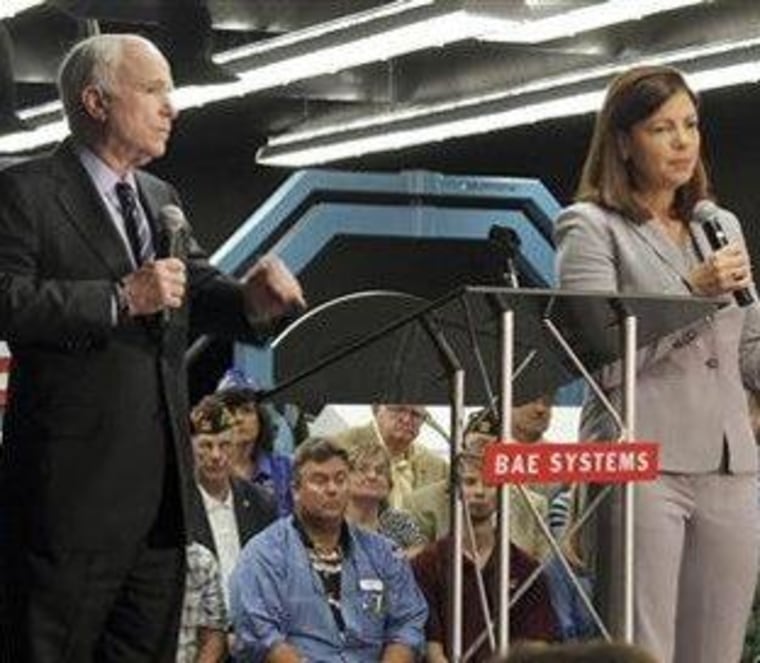Republicans Sens. John McCain, Kelly Ayotte, and Lindsey Graham kicked off the first in a series of public events yesterday, intended to highlight the apparent dangers of deep, automatic defense cuts due at the end of the year. The first event was in Ayotte's home state of New Hampshire, where the lawmakers spoke at BAE Systems, which stands to lose thousands of jobs from reduced government spending.
At the event, McCain said:
"This was generated by Congress, and the president has a legitimate point when he says, 'Well, Congress is the one that came up with this cockamamie idea, and so,' as he said the other day, 'let them wiggle out of it.' Well, I understand that logic and there's something to it."
Yes, actually, there is. In fact, Graham told reporters yesterday, "What was our Republican leadership thinking when they agreed to the concept of sequestration?"
I've been wondering the same thing. McCain, Ayotte, and Graham are traveling from swing state to swing state, railing against the proposed defense cuts, which many Republicans blame on President Obama. But as the tour continues, is it too much to ask that the political world remember that these cuts were the GOP's idea?
As we've discussed, as part of last year's debt-ceiling deal, policymakers accepted over $1 trillion in cuts that would be implemented if the so-called supercommittee failed. Democrats weren't completely willing to roll over -- they wanted to create an incentive for Republicans to work in good faith.
Republicans agreed: if the committee failed, the GOP would accept defense cuts and Dems would accept non-defense domestic cuts. The committee, of course, flopped when GOP members refused to compromise, which put us on the clock for the automatic reductions that Republicans contributed to the very process they insisted upon.
So why blame Obama? He's not the one who came up with the debt-ceiling crisis; he's not the one who recommended the defense cuts; and he's not the one who refused to compromise during the supercommittee talks.
Indeed, the larger question now is what Republicans prioritize more: defense spending or tax breaks.
Greg Sargent had a good item on this yesterday.
Republicans such as John McCain and Lindsey Graham have been touring swing states to highlight the looming sequester cuts to defense spending that are set to be triggered by the deficit supercommittee's failure. They have said such cuts will be devastating to our national security, and have blamed Obama and Dems for the imminent threat.At the same time, House Republicans will vote this week against the Democratic plan to extend tax cuts on all income over $250,000, because it doesn't extend the cuts on all levels, including income higher than that.So here's the question: If the looming sequester cuts are such a threat to national security, why doesn't that undermine Republican leverage in the discussions over what to do about the tax cuts?
Right. The looming, automatic cuts are inching closer to reality because Republicans refuse to consider some tax increases as a solution to the debt problem they sometimes pretend to care about. If GOP officials accepted new tax revenue, a deal could come together and these large defense cuts would simply be taken off the table.
But Republicans, at least for now, won't budge -- they want a larger agreement that would eliminate the need for deep Pentagon cuts and they want a deal that doesn't require any increases on any one at any time.
McCain, among others, pushed the argument yesterday that it's up to Obama to "lead" by bringing policymakers together and working out a solution. That sounds nice, but it's foolish -- the president has tried this repeatedly, but Republicans won't compromise. Indeed, even now, McCain is urging Obama to work towards a compromise while McCain's party simultaneously says it won't compromise.
And so it's the GOP that has a decision to make. While they decide, if they could stop blaming the White House for the Republicans' own idea, it'd make the conversation a lot less ridiculous.
